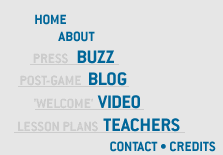EVERYTHING ABOUT THE GAME:
Learn About WWO
![]()
THE HISTORICAL RECORD:
Enter the WWO Archive
Relive the Oil Crisis of 2007. Use the Wayback Machine at the Internet Archive to explore the 32 weeks of the oil shock.
EVERYTHING ABOUT THE GAME:
Learn About WWO
![]()
THE HISTORICAL RECORD:
Enter the WWO Archive
Relive the Oil Crisis of 2007. Use the Wayback Machine at the Internet Archive to explore the 32 weeks of the oil shock.
It's a serious game for the public good,
addressing the issue of oil dependency
and energy security
World Without Oil "pre-created" a possible near-future scenario: a global oil shock where demand rises 5% over supply. It did so to engage the public with this possible future, with the end goal of making this future less likely to actually happen. The game's tagline says it all: "Play it – before you live it." A non-profit public media company, ITVS of San Francisco, commissioned the game, and the Corporation for Public Broadcasting funded it.
This is public media at its most innovative, engaging a global public concerned with the world’s dependence on oil and both educating them and moving them to action.
JESSICA CLARK – CENTER FOR SOCIAL MEDIA, AMERICAN UNIVERSITY
The game did not push a point of view. The
game team sought to make the fictional event
real, and let players draw their own lessons from their
experience in this alternate reality
By design, the WWO game did not dictate points of view or outcomes to the players. The WWO team established realistic macroparameters of the oil shock (such as the price and availability of fuel on any given week) but relied on the players to successfully imagine how those macroparameters would change everyday life. By design, WWO "crowdsourced" the ramifications of a global oil shock as experienced at the local, personal level – knowing that by doing so, the collective imagination would see outcomes that elude even experts in the field.
World Without Oil got my attention precisely by the uniqueness of the concept: to ask young people to publish imaginary reports over the weeks after an oil shortage begins, an event with multiple economic, social and environmental consequences. The result is of an astonishing quality. The participants got to the heart of a complex subject.
FRANÇOIS GUITÉ – RELIEF
WWO aimed to use its game structure to
create a productive imaginative space where
people felt free to express ideas and
motivated to contribute to the greater whole
WWO took the collaborative gameplay concepts of commercial alternate reality games and applied them for the first time to a real world issue. We believed that by giving players a real voice in the story of the oil crisis, it would engage them with its issues in a visceral, personal way. The result: WWO changed people's lives (or, more accurately, the game created an imaginative space where they could and did change their own lives).
As for me, in this here and now, I'm a different person thanks to WWO. I'm much more aware of the fragile thread that supports the lifestyle I and others keep. I'm making changes, but there's a long way to go. But I AM changing, and that means that for me, WWO was a success.
MTALON (PLAYER)
WWO made it easy for anyone to play
(low barrier to entry). The game
characters acted as players, effectively
demonstrating how to participate
WWO was a game for everyone, not just gamers. All that was required was a willingness to suspend disbelief, to get "in game" and imagine that the oil crisis was really happening to you. The technical requirements were low, as people could play via email or even by phone. And because the game was asking each player what was happening to him or her, players felt free to assert their ideas and brainstorm solutions.
The beauty of WWO's oil shock is the extent to which oil scarcity is already considered an issue that spans the personal, political, financial, and scientific, and WWO, recognizing this, allowed players to engage on the levels most compelling to them. NINA SIMON – MUSEUM 2.0
The game sought to create pro-active solutions.
By creating an immersive, interactive simulation,
World Without Oil opened the way for people to
collaborate with peers on awareness, education,
preparedness and prevention
By design, the gameplay in WWO generated ideas for solutions to the problems of oil dependency and energy policy. As players and viewers immersed themselves in the alternate reality and sought solutions to the situations brought on by the oil crisis, they brought this thinking back to their real lives. Many of them reported this resulted in change to their real lives: greater awareness about energy use, more conservative energy practices, more questioning of energy consumption and policy, and so on. They "played it, so they wouldn't have to live it."
In the end, the entire enterprise feels less like a traditional game, and more like a war game or scenario simulation. Except World Without Oil isn’t about our leaders visualizing their strategies and determining how they would respond to potential crises… It’s about us developing those same skills. For that reason alone tools like World Without Oil are exciting, since they begin to re-empower us all to understand and take control of the events happening around us. ECOPUNK
Forget Live Earth, nothing’s made me sit up and take notice more than World Without Oil, a hypothetical web journal documenting a week by week account of life in America as oil supplies dwindle. It confirms for me that digital, and Alternate Reality Games in particular, could really steer society to saving mother earth. SIMEON – HYPERHAPPEN







WHAT'S GOING ON HERE?
I'M MYSTIFIED.
![]()
WHAT IS A SERIOUS GAME?
WHAT IS AN ALTERNATE REALITY GAME?
![]()
WHAT ARE WWO's GOALS
AND METHODS?
![]()
WHAT DOES THE GAME DEMONSTRATE?
![]()
WHAT IS THE GAME ARCHIVE?
HOW DO I ENTER?
![]()
THE GAME SEEMS TO BE OVER.
CAN I STILL PLAY?
![]()
I FOUND A BROKEN LINK. NOW WHAT?
![]()
WHAT'S GOING ON NOW?
IS THERE A WWO BLOG?
![]()
